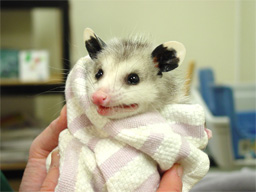It’s not rare in our neck of the woods to come across wild animals. Many of you have probably seen raccoons, opossums, and groundhogs near your house, not to mention squirrels. A wild turkey was roaming some West Philly neighborhoods last spring, which was well documented thanks to neighbor reports and photos. I came face to face with a young opossum on my porch last fall that I first confused with my cat. This post, though, is about what you should do if you encounter a wild animal that needs help, if it is sick, injured or if you found a baby animal with no mother in sight.
West Philly Local reader Kameliya Atanasova and her neighbors had a very close encounter with three seemingly lost baby raccoons off of 49th and Florence Streets on Monday. When they contacted the ACCT (Animal Care and Control Team) they were referred to the Schuylkill Wildlife Rehabilitation Clinic, which is part of The Schuylkill Center for Environmental Education. The clinic cares for injured, sick and orphaned wildlife native to Southeastern Pennsylvania. It is located in the Roxborough section of Philadelphia (304 Port Royal Avenue) and is open to accept animals during the following hours (April to September): 10:00 am – 6:00 pm seven days/week, according to information on their website.
However, before calling the clinic please read this page: “What Do I Do If …“.
For some reason, the clinic wasn’t open on Monday and Tuesday, Kameliya writes. Luckily, two of the three baby raccoons successfully found their momma on their own. It is not known what happened to the third one as it appeared rather scared by curious passersby. The Schuylkill Center’s page on what to do in these cases warns people to not interfere unless the animal is injured or the mother is dead.
“My neighbors and I all made the mistake of being in close proximity to the raccoons which scared them and only challenged/delayed their reunion with their mother. If more of us knew about the Schuylkill Center as a resource and their recommendations about how to handle such situations, we could all react in a more informed manner during close encounters with wildlife. I personally didn’t even know of its existence until I spoke with the ACCT,” writes Kameliya.









Recent Comments